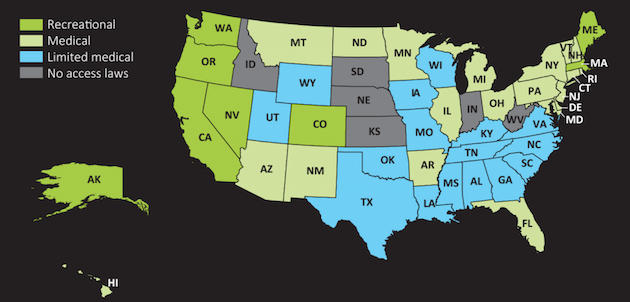The World Health Organization met in Geneva, Switzerland, this week to review a first-of-its-kind report on the health and safety of cannabis, and President Donald Trump’s Justice Department will almost certainly not be thrilled with the report’s finding that marijuana is a “relatively safe drug.”
The report, compiled by a team of international cannabis experts and presented to the Expert Committee on Drug Dependence, is the first of many steps by the WHO to ultimately deliver a recommendation to the UN secretary-general on the “need for and level of international control” of cannabis, which could have a major impact on marijuana legislation internationally. Cannabis is currently classified under the same category as heroin and cocaine.
“If the scheduling of cannabis changes at an international level, there’s nothing that will happen immediately,” says Steph Sherer, executive director of Americans for Safe Access, a cannabis advocacy group. Sherer also testified at the committee meeting this week. She told Mother Jones, however, that a scheduling change would indicate “a global openness to utilizing cannabis therapeutics in natural health strategies.”
By contrast, Attorney General Jeff Sessions has come down hard on marijuana, calling it nearly as harmful as heroin and “a very real danger.” Most infamously, he once said, “good people don’t smoke marijuana.” Sessions has also pledged to crack down on cannabis businesses and farms in states where cannabis is legal, but in April, Trump walked back those threats, promising his administration would not interfere with states’ rights. Trump now says he would support a congressional effort to end the federal ban on marijuana.
Countries like Australia, Chile, Germany, Israel, Peru, and the Netherlands have already legalized the use of medical marijuana, and on Thursday, Canada’s Senate voted to legalize recreational cannabis. More than half of American states allow marijuana for medical use.

Marijuana laws in the US
WHO
The committee examined several forms of cannabis, including two of its most abundant molecules, THC and CBD. THC causes the “high” commonly associated with smoking pot—giddiness, euphoria, time distortion, etc.—while CBD provides non-psychoactive effects. CBD has been used as an anti-depressant, anti-nauseate, sleep aid, and sedative, among other treatments.
The report concludes that while driving under the influence of cannabis is risky, it’s not as risky as driving under the influence of alcohol. And according to the report, cannabis evidently has medical benefits—treating cancer, pain, and anxiety, for example (though research shows it can be dangerous for groups like pregnant women and children).
Here are some of the report’s major takeaways:
Findings on cannabis in general
- Worldwide, an estimated 183 million adults used cannabis in 2015. It’s grown in 135 countries and is the “most widely illicitly produced drug worldwide.”
- Although cannabis is a “relatively safe drug,” cannabis use disorder, also known as cannabis addiction, is fairly common. About one in eight cannabis consumers are considered to be “dependent” on weed.
- Pregnant women should lay off the ganja. There is strong evidence that smoking during pregnancy can reduce newborn birthweight.
- Young children may also be vulnerable to negative effects of cannabis. Recent reports indicate that young children who accidentally consume pot can experience respiratory depression, rapid heart rate, or in severe cases, temporary coma.
- People driving under the influence of cannabis are more likely to be involved in a car accident—but the level of risk is generally not as great as with alcohol. One of the world’s largest studies, the report says, included nearly 240,000 participants in 13 countries and showed that cannabis use “caused a low-to-moderate (20 to 30 percent) increase of being in an accident.”
- Research shows that in several types of cancer, cannabis can slow the spread of the disease, but smoking weed is also tied to an increased risk of testicular cancer 2.5-fold.
- There is a “weak” association between cannabis use and heart attack. Smoking cannabis plant matter can increase this risk, so vaping or using edible forms of cannabis are the safest for your respiratory system.
- The largest study to date on cannabis and respiratory health followed 5,000 people over 20 years. It found that people who smoked the equivalent of three to five joints of cannabis per month actually saw improved respiratory function, whereas respiratory function for heavy users was impaired.
- There is limited research on the medical use of cannabis, even in the face of mounting crises like the opioid epidemic: “Despite intense interest in the effects of cannabis on opioid use disorder, especially in the USA,” the report reads, “there have been no randomized controlled trials of cannabis for this disorder.”
Findings on pure CBD (Cannabidiol)
- CBD is not known to be addictive, and there is no evidence of public-health-related problems associated with the use of pure CBD, according to the report.
- CBD has been shown to, in some cases, treat epilepsy. In the US, one CBD product—Epidiolex—is under current review for approval. People also use CBD products—oils, supplements, gums, and extracts—to self-treat many minor ailments, the report said.
Findings on pure THC (Delta-9-Tetrahydrocannabinol)
- It’s nearly impossible to overdose on THC. A 150-pound human, for example, would need to consume approximately 4 grams of THC to overdose—roughly the equivalent of smoking more than 260 joints at once. (According to the Drug Enforcement Administration, no one has ever overdosed on pot.)
- THC can provoke “conceptual disorganization, fragmented thinking, suspiciousness, paranoid and grandiose delusions, and perceptual distortions,” though all are temporary, according to the report (and anyone who has lived through the ’70s).
The WHO will likely do at least one more review before making a final recommendation on cannabis’s status to the UN’s secretary-general, António Guterres.

















